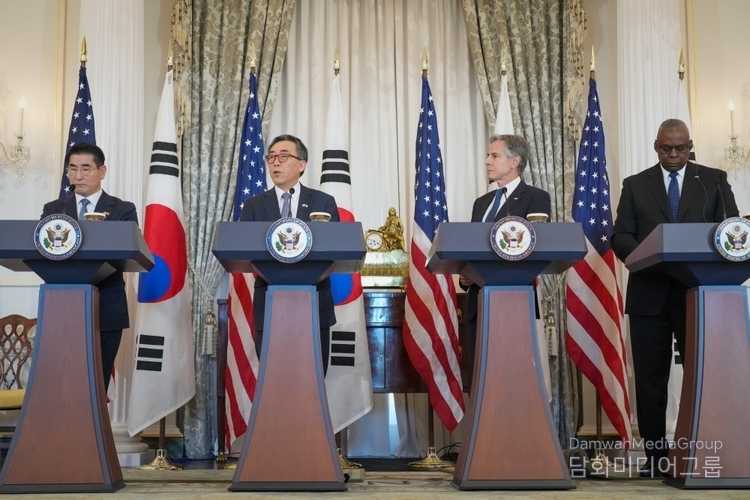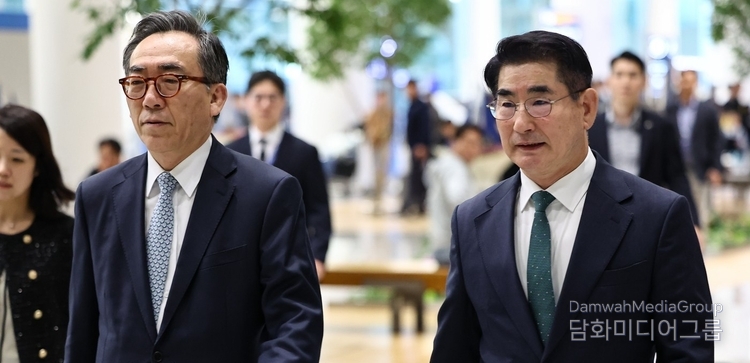By Diplomacy Journal Lee Kap-soo
Minister of Foreign Affairs Cho Tae-yul and Minister of National Defense Kim Yong-hyun held a joint foreign and defense ministerial meeting with U.S. Secretary of State Antony J. Blinken and Secretary of Defense Lloyd J. Austin in Washington on Oct. 31, 2024.
The two sides reaffirmed the shared vision, common values, and unwavering commitment to their combined defense posture and the Mutual Defense Treaty (MDT) as the bedrock of our security partnership. They noted the U.S.-ROK Alliance serves as the linchpin of peace, security, and prosperity on the Korean Peninsula and throughout the Indo-Pacific region.

Both sides affirmed that our unwavering resolve is our greatest deterrent and pledged to coordinate closely together in the event of any provocations. The recent conclusion of consultations on the Special Measures Agreement serves as a tangible symbol of our shared commitment to the Alliance, enhances our combined defense posture, and supports the continued presence of U.S. forces stationed on the Korean Peninsula.
The Secretaries and Ministers also recognized the U.S.-ROK Alliance has evolved into a global comprehensive strategic alliance, built on respect, trust, close friendship, strong people-to-people connections, and the shared values of freedom, democracy, human rights, and the rule of law. They committed to further advancing mutually reinforcing and forward-looking cooperation across a broad spectrum of areas, including climate change, health security, nonproliferation, and supply chain diversification.
The United States reaffirmed its commitment to the defense of the ROK. The Secretaries and Ministers further pledged to enhance the Alliance's deterrence posture and emphasized the importance of maintaining joint readiness against shared regional and global threats through combined training and exercises.
The Secretaries and Ministers noted that U.S. forces in the ROK continue to play a critical role in maintaining peace and stability on the Korean Peninsula and in the region, and committed to ensure that we have the force posture and capabilities necessary to meet our common challenges.
The Secretaries and Ministers also highlighted deepening U.S.-ROK security cooperation to enhance interoperability and strengthen extended deterrence by the continued implementation of commitments outlined in the U.S.-ROK Washington Declaration, announced by Presidents Biden and Yoon in April 2023.

Both sides reiterated that the ironclad U.S. extended deterrence commitment to the ROK is backed by the full range of U.S. capabilities, including nuclear. They reaffirmed that any nuclear attack by the Democratic People’s Republic of Korea (DPRK) against the ROK will be met with a swift, overwhelming, and decisive response. The United States also reiterated that any nuclear attack by the DPRK against the United States or its allies is unacceptable and will result in the end of that regime, in line with the 2022 U.S. Nuclear Posture Review.
Both sides welcomed the achievements of the Nuclear Consultative Group (NCG), an enduring bilateral forum that has continued work to strengthen extended deterrence, discuss nuclear and strategic planning, and manage the threat the DPRK poses to the global nonproliferation regime.
They applauded the successful completion of the “U.S.-ROK Guidelines for Nuclear Deterrence and Nuclear Operations on the Korean Peninsula,” which represents the tremendous progress of the NCG, as commended and endorsed by President Biden and President Yoon. The Guidelines provide the principles and procedures for the Alliance to maintain and strengthen credible and effective nuclear deterrence as equal partners, with further progress planned for the next principal-level NCG meeting later this year.
Both sides pledged to deepen consultations and strategic planning, further enhance the regular visibility of U.S. strategic assets to the Korean Peninsula, and expand table-top exercises and simulations to ensure an effective response to any changes in the threat environment.
They also affirmed the need for the Extended Deterrence Strategy and Consultation Group (EDSCG) to discuss and coordinate on security strategy and policy issues affecting the Korean Peninsula and the broader Indo-Pacific region – including by leveraging all elements of national power.
The Secretaries and Ministers committed to collaborate against harmful disinformation about extended deterrence on the Korean Peninsula. The ROK expressed its support for U.S. efforts to engage the People’s Republic of China and Russia on reducing nuclear risks.
Both sides reaffirmed their longstanding commitment to their obligations under the Nuclear Non-Proliferation Treaty (NPT) as the cornerstone of the global nonproliferation regime, as well as their continuing commitment to the complete denuclearization of the Korean Peninsula, consistent with United Nations Security Council (UNSC) resolutions.
The Secretaries and Ministers strongly condemned the DPRK's dangerous and provocative behavior, including its intercontinental ballistic missile (ICBM) test on October 31 (local time) and continued pursuit of weapons of mass destruction and ballistic missile programs in violation of multiple UNSC resolutions.
The ICBM test only demonstrates the DPRK continues to prioritize its unlawful weapons of mass destruction and ballistic missile programs over the well-being of its people, and we call on the DPRK to cease its destabilizing actions. The two sides committed to further enhance coordination, including through the Multilateral Sanctions Monitoring Team (MSMT), to address violations and evasions of UN sanctions by the DPRK, including violations of the arms embargo and other related military cooperation, dispatch of overseas laborers, malicious cyber activities, oil smuggling, and the trade of prohibited items, including by ship-to-ship transfers.
Both sides reiterated that the DPRK’s human rights violations and abuses were inextricably linked with its unlawful WMD and ballistic missile advancements, and committed to further strengthening cooperation to promote human rights in the DPRK. The United States expressed its support for the goals of the Audacious Initiative and President Yoon's vision of a free, peaceful, and prosperous Korean Peninsula, and reiterated its support for a peacefully unified Korean Peninsula that is free and at peace. Both sides reaffirmed that they remain open to dialogue with the DPRK without preconditions.
Both sides also recognized the importance of the Joint Foreign and Defense Ministerial as an important bilateral forum to further enhance the Alliance, and committed to holding the Ministerial Meeting regularly.
